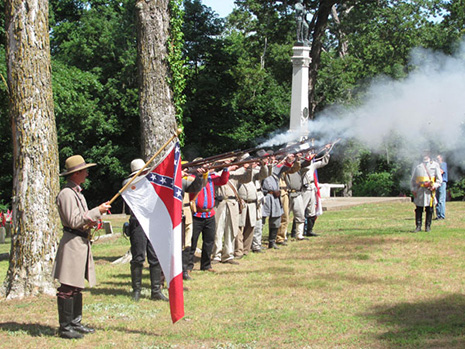
FAYETTEVILLE, Ark. – Gregory Benton is preparing for battle.
Benton, an assistant professor of recreation and sport management at the University of Arkansas, has been studying Civil War re-enactment events in Northwest Arkansas to determine the motivations for and benefits of the activity. Benton studies the field of interpretation at national and state parks and is conducting a research study concerning the 150th anniversary of the Battle of Prairie Grove. A re-enactment is planned for Dec. 1-2 at Prairie Grove Battlefield State Park.
But before he heads to Prairie Grove, Benton will present his findings from recent research at the National Association for Interpretation national conference Nov. 13-17 in Hampton, Va. He has presented research for several years at both national and international meetings of the association. His work leading up to the national conference included interviewing participants and observing other re-enactment events in Northwest Arkansas.
Benton’s work deepens the understanding of the historical interpretation that Civil War re-enactors and living history practitioners provide to the public. On Dec. 7, 1862, the Confederate Army of the Trans-Mississippi clashed with the Union Army of the Frontier in a day of fierce fighting at Prairie Grove that resulted in about 2,700 casualties. This marked the last major Civil War engagement in Northwest Arkansas, according to the Arkansas Department of Parks and Tourism.
“Civil War re-enactors conduct the work of trained interpreters, connecting audiences to historical, cultural and natural resources,” said Benton, who has conducted extensive research into the role of interpreters. “While most of these re-enactors and living history practitioners participate as a form of leisure, they also serve a vital role in the overall interpretive programming at many historic sites and battlefields.”
Re-enactors participate in staged battles while living history practitioners give non-battle demonstrations of life during the Civil War era including meetings, cooking, sewing, music, dances and camp life. Benton’s research presentation in Virginia will cover a case study for which he conducted both phone and in-person interviews with re-enactors and living history practitioners.
He found that re-enactors are keenly interested in history in general and in the Civil War in particular and that their interest was often strengthened by a family history that included participation in the Civil War. He also found a high level of intrinsic motivation shared by re-enactors. That could help explain why there is little bureaucratic control of re-enactments and few interpretive standards of practice for them, Benton said.
“Second, re-enactors were highly influenced by the social aspect of the activity,” Benton said. “The camaraderie of fellow re-enactors during overnight camps and battle sequences was very important. The general public is not usually allowed into re-enactor campus and is often at considerable distance from the battles themselves.”
This finding suggests that a large portion of the re-enacting experience is unavailable to spectators.
Following the December battle re-enactment at Prairie Grove, Benton will interview visitors to the event regarding the benefits of this historical re-enactment at an Arkansas state park.
In addition to researching re-enactments, Benton interviewed participants at a ceremony June 2 celebrating the Confederate Cemetery on Rock Street in Fayetteville. The Southern Memorial Association of Washington County, considered to be the oldest organization of women west of the Mississippi, sponsored the service for the cemetery’s 139th anniversary. The Southern Memorial Association, which was celebrating its 140th anniversary, is a group of women who purchased land for a final resting place for soldiers killed in the Civil War battles of Prairie Grove, Pea Ridge and elsewhere in Northwest Arkansas.
Contacts
Gregory Benton, assistant professor of recreation and sport manage
College of Education and Health Professions
479-575-4110,
Heidi Wells, content writer and strategist
Global Campus
479-879-8760,